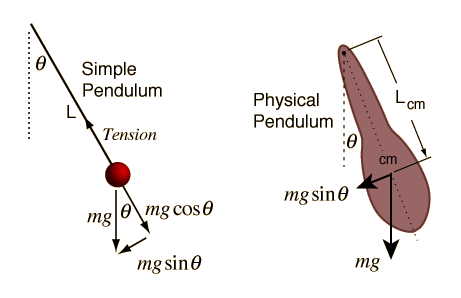Simple Pendulum
A simple pendulum is one which can be considered to be a point mass suspended from a string or rod of negligible mass. It is a resonant system with a single resonant frequency. For small amplitudes, the period of such a pendulum can be approximated by:
This expression for period is reasonably accurate for angles of a few degrees, but the treatment of the large amplitude pendulum is much more complex. |  |
If the rod is not of negligible mass, then it must be treated as a physical pendulum. |
Periodic motion concepts
| HyperPhysics***** Mechanics | R Nave |















